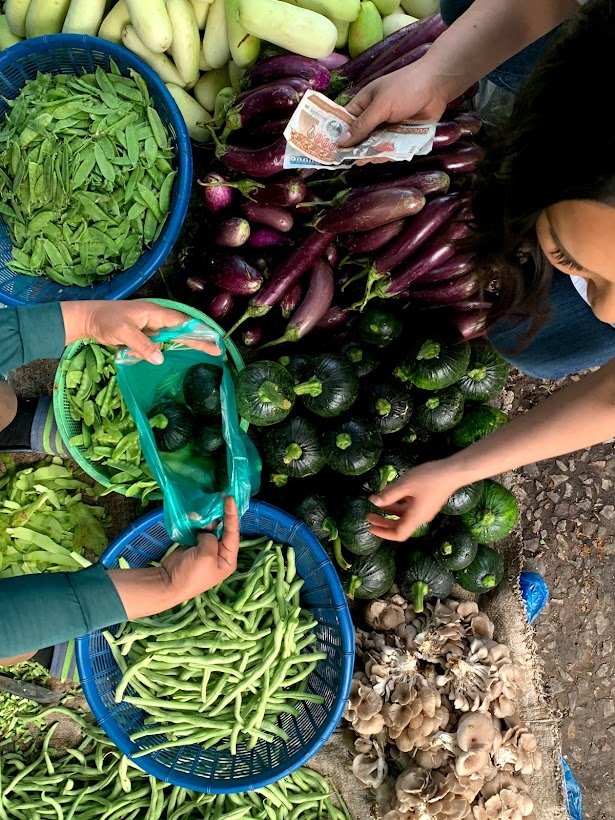The New Normal In Laos
An executive summary on how COVID-19 has affected local Lao businesses in the short and long term
Photo: Lao Food Foundation - Bamboo Tree Cooking School in Luang Prabang
Written by: Victoria Lasavath
Edited by: Channapha Khamvongsa, Dorothy Culloty
In 2019, Laos had a record breaking 4.7 million tourists, with an upward trajectory predicted for years to come. Then the pandemic hit, upending daily life and disrupting the economy, including some of the most critical sectors: tourism, manufacturing and handicrafts. For example, in 2020, there was a 81.5% decrease in tourism, with only 886,447 visitors.
The Lao National Chamber of Commerce and Industry (LNCCI) predicts that Lao businesses will need one and a half years to recover from the 2020 lockdown on top of the two years needed from the 2021 lockdown. The United Nations expects that over 70% of Lao micro, small and medium-sized enterprises (MSMEs) will not survive without economic improvement in the next six months as reported by the Center for Strategic & International Studies (CSIS).
Furthermore, CSIS reports that these sectors of tourism, manufacturing and handicrafts comprise mostly of women, resulting in the pandemic disproportionately impacting Lao women.
One of those women include Vandara ‘Mae Vanh’ Amphaiphone of Vanvisa Guesthouse in Luang Prabang. The Lao Food Foundation spoke with her and other small business owners we met at the first Lao food retreat back in February 2020, about how the last two years have impacted their small businesses.
Firmly vested in tourism, ’Mae Vanh’ and her team provide guests with a relaxing stay frolicking in the scenic water that flows from Kuang Si through the back of the guesthouse and to take a break to enjoy one of the many daily dishes of fresh ingredients picked from her farm, offered by Vanvisa and her staff.
‘Mae Vanh’ and her team have had to pivot throughout the pandemic and learned to be self-sufficient by family members during lockdowns and limited staff. She is writing a book in hopes to share her love for the culture and cuisine and to elevate Lao food on a global scale.
Photo: Channapha Khamvongsa - Madame Vandara at Vanvisa, restaurant in Luang Prabang
An industry not as impacted was agriculture. In fact, the sector absorbed 10% of workers who had been laid off in manufacturing and trade—and will be a key driver of Laos’s economic recovery.
When the outbreak started, the Ministry of Health built Emergency Operations Centers in each province to facilitate medical services and the National Taskforce Committee for Covid-19 Prevention and Control supported the communities. In 2020, Laos reported the lowest number of all Covid-19 cases in the Association of Southeast Asian Nations.
Development stakeholders have also provided economic and legal support for agriculture, green tourism, e-commerce, and human-trafficking prevention initiatives. The World Bank and the Lao government agreed to scale up a USAID-backed Competitiveness and Trade Project in October 2021 to help businesses recover; the World Bank will provide a $6.5 million grant to complement the government’s provision of relief to vulnerable firms.
The Lao Food Foundation also spoke to other small business owners to get insight on how their businesses have fared during the pandemic. Duangmala Phommavong of Le Parasol Blanc Hotel in Luang Prabang shared that all three of their hotels closed. Phommavong saw certain businesses maintain operations in accordance to COVID-19 operational protocols. With the pandemic, Phommavong also saw opportunities such as advocating for Lao Thiew Lao (Lao Travel Lao) domestic travel in Laos during pandemic to help support local businesses.
Somchit ‘Chit’ Phankham of Panyanivej Organic Farm in Vientiane is also very much looking forward to the growth within the agricultural sector of Laos. In 2015, Phankham invested in a small farm business. Phankham wants to promote youth agriculture activities and wants to reintroduce the farm to table model fused with tourism. The objective would be to resonate with newly graduated scholars from agricultural studies and offer fellowships where they will also learn how to cook sustainably. While the pandemic is challenging, Phankham also sees it as an opportunity for rebirth and renewal.
Ock Pop Tok founder Veomanee Doungdala in Luang Prabang. Doungdala started a family farm business where they deliver fresh produce to local markets and hopes to create a more sustainable business practice with healthier menus and distributing any surplus of produce.
Photo: Lao Food Foundation - Veomanee Doungdala hosted a dinner at Silk Road in Luang Prabang during the Lao Food Retreat
While being able to digitally connect with clientele is a struggle, some businesses can thankfully rely on loyal followings from their community and relationships they’ve built from being in business for a certain amount of years. 31% of small-business owners who temporarily closed due to COVID attribute their reopening to customer support.
Dalaphone ‘Touty’ Pholsena of Kualao Restaurant in Vientiane shares that 2020 was the first time the restaurant had to be closed in their 28 years of business. Kualalo shifted from 70 seats to 15 and embraced the takeout business model. Pholsena says that fortunately, longtime customers would call to order takeout to support local businesses and she would try to do the same to pay it forward at other local restaurants.
While the economy in Laos has an upward hill to climb to reach anything remotely close to pre-pandemic levels, Pholsena and many others share the sentiment of the Lao people and that is no matter how little or much you have, you still have room to give and to take care of each other.
Photo: Lao Food Foundation
Victoria Lasavath
Communication and marketing support
Los Angeles, CA





